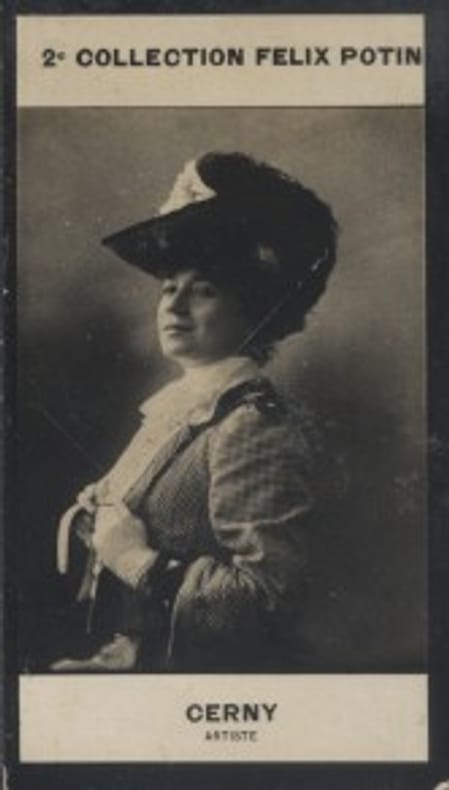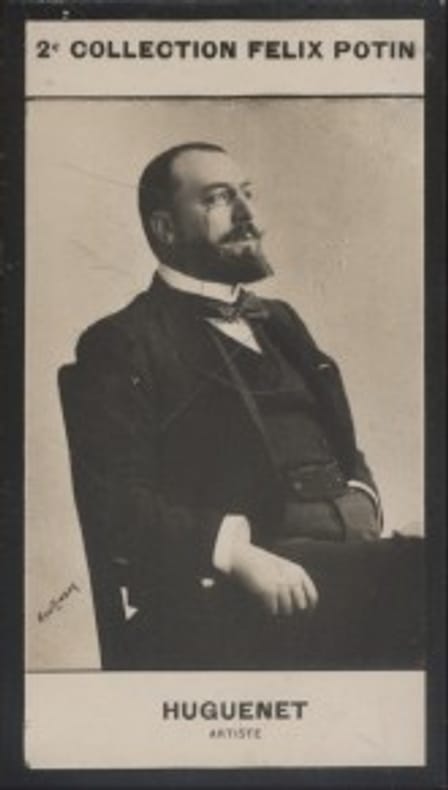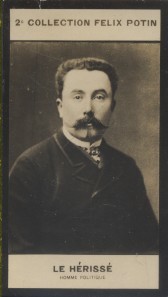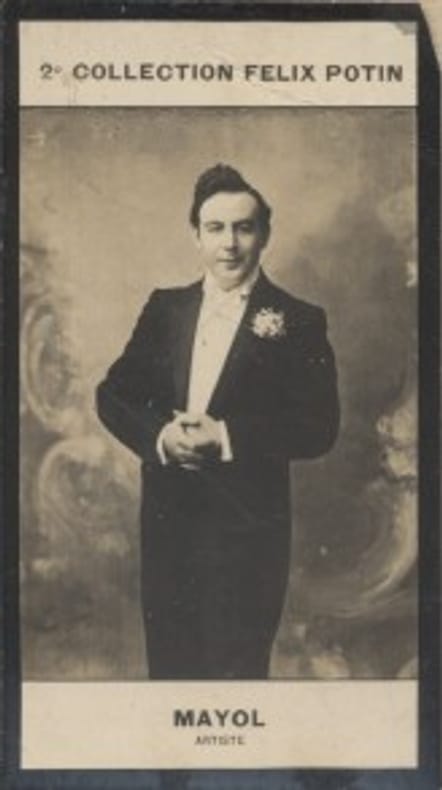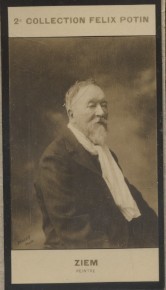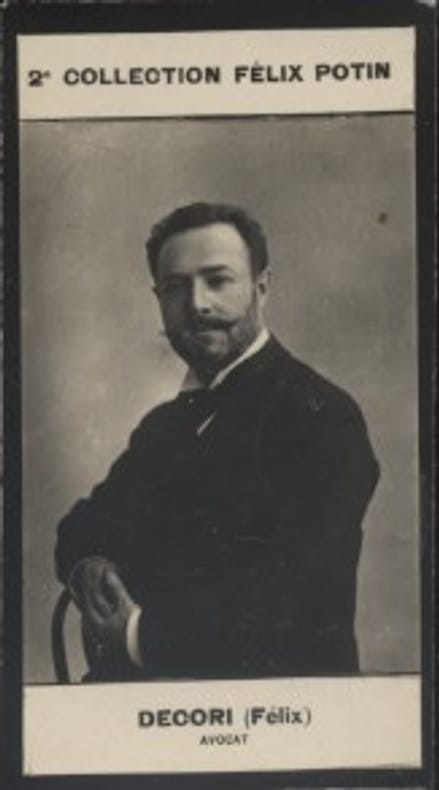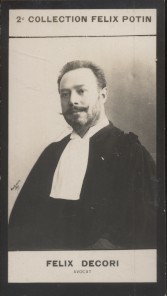11037 books for « felix r p »Edit
-
Type
Any type (1)
Art print (2)
Artists book (3)
Book (8971)
Engraving (22)
Magazine (8)
Manuscript (1)
Maps (58)
Music sheets (823)
Old papers (18)
Photographs (1130)
Posters (3)
-
Latest
Last 24h (8)
Last 3 days (85)
Last month (101)
Last week (8)
-
Language
Dutch (5)
English (17)
French (10760)
German (13)
Italian (1)
Latin (1)
Romanian (1)
Russian (232)
Spanish (10)
-
Century
16th (2)
17th (15)
18th (86)
19th (3803)
20th (3337)
21st (226)
-
Countries
Belgium (654)
Brazil (3)
Canada (73)
China (8)
Côte d'Ivoire (43)
Denmark (38)
France (9436)
Germany (12)
Greece (10)
Italy (12)
Netherlands (24)
Switzerland (483)
United Kingdom (3)
United States of America (241)
-
Syndicate
ALAC (47)
CLAM (41)
CLAQ (21)
CNE (9)
ILAB (4717)
NVVA (85)
SLACES (85)
SLAM (4379)
SNCAO (32)
Topics
- Africa (35)
- Archaeology (45)
- Architecture (72)
- Autographs (58)
- Belgium (76)
- Benoist félix (50)
- Bicycle (75)
- Biography (95)
- Brittany (43)
- Carpenter (51)
- Catholicism (62)
- Children’s books (72)
- Christianity (84)
- Comic strip (155)
- Cycling (75)
- Dauphiné (40)
- Dedication (45)
- Director (54)
- Drawings (52)
- Early printed books (41)
- Education (61)
- Engraving (books about) (77)
- Engravings (45)
- Fine arts (109)
- First edition (192)
- Galipaux félix (36)
- Geography (120)
- Germanic languages (43)
- Germany (37)
- Helvética (84)
- Hemon félix (72)
- History (546)
- Latin (61)
- Law (70)
- Le dantec félix (43)
- Linnean society of lyons (45)
- Literature (672)
- Lyons and area (45)
- Lyons college (45)
- Lyons college pc (45)
- Lyons revue (46)
- Magazine (55)
- Manuscripts (47)
- Maps (54)
- Marinier paul (37)
- Mathematics (65)
- Medicine (166)
- Mendelssohn (111)
- Military arts (87)
- Mosaic (191)
- Music (69)
- Navy (74)
- Nettement alfred (47)
- Newspapers press (88)
- Normandy (46)
- Opera (41)
- Opera ballet (41)
- Painting (135)
- Paris (143)
- Periodicals (111)
- Philosophy (179)
- Photography (1208)
- Poetry (83)
- Policy (102)
- Provence (63)
- Psychology (59)
- Regionalism (128)
- Religions (217)
- Review (44)
- Reviews (75)
- Revolution 1789 (42)
- Russia (53)
- Sciences (80)
- Scores (832)
- Sculpture (40)
- Songs (749)
- Switzerland (89)
- Tales (41)
- Theatre (301)
- Theology (77)
- Timmermans felix (55)
- Tournachon félix (83)
- Travel (61)
- Various (49)
- War (96)
- Zoology (37)
Sténographie, ou l'art d'écrire aussi vite que parle un orateur. Méthode qui n'omet aucun des éléments de la parole, jugée, par les savants et les praticiens, le plus rapide des procédés connus, et plus facile à lire que l'écriture usuelle. Cette sténographie, aidée d'un système d'abréviation applicable à tous les idiômes, à toutes les écritures, présente un mode général de simplification des langues écrites. ''Abréger ses travaux, c'est prologer la vie''
Paris, Chez l'auteur et Jombert, 1817. 370 g In-8, demi vélin, 224 pp.. Illustré de 10 planches hors-texte dépliantes lithographiées. Troisième édition dont les planches sont sorties des presses de C. de Lasteyrie car deux planches (5e et 10e) en portent l'adresse. En 1817 Lasteyrie débutait son activité parisienne de lithographe, cette édition peut donc être qualifiée d'incunable lithographique. Havette, Bibliographie de la ste?nographie franc?aise, p. 29. Louis-Félix Conen de Prépean, noble d'origine bretonne dont les ancêtres possédaient le manoir de Pré Péan à Pordic, est devenu un spécialiste de la sténographie. On apprend dans la préface de son ouvrage qu'il a produit les traductions sténographiques imprimées d'Atala et de Paul et Virginie, deux éditions qui semblent devenues très rares. Quelques rousseurs, petites traces d'humidité marginale. . (Catégories : Sténographie, Lithographie, )
Soirées religieuses et polémiques, ou dialogues à l'usage de plusieurs classes de la société. Ouvrage entrepris en faveur des pauvres malades d'une grande paroisse, par M. L'abbé Prévost, vicaire de Saint-Vivien
Rouen, Fleury, 1833. 1020 g 4 volumes in-8, pleine basane, viii-344 pp.; [1] f., 278 pp.; [1] f., 274 pp.; [1] f., 298 pp.. Jean Félix Casimir Leprevost, dit l'abbé Prévost, était connu pour sa très grande charité. Frère, II, 416; Lebreton, biographie rouennaise, 247-248. Publication locale, très rare. Tache pâle sur un dos, petites traces d'humidité. . (Catégories : Religion, Normandie, )
Monologues et récits
Paris, Paul Ollendorff, 1883. 250 g In-12, demi basane bleue nuit, [2] ff., 110 pp.. Dédicace de Félix Galipaux à Frantz Jordain. Ex-libris de Jules Dilly, professeur de diction. Annotation ''phonétique'' à un feuillet. Frottements. . (Catégories : Littérature, )
HET DERTIENDE KIND. 7e Jaarboek 1979 van het Felix Timmermans genootschap
, Jaarboek 1979 van het Felix Timmermans genootschap,, Ingenaaid, originele omslag in kleur en opdruk, 143pp +foto's, ISBN 9026435460.
het zevende jaarboek, Het dertiende kind (Louis Vercammen)Felix Timmermans op school ,(Jose De Ceulaer) De man van de Lion, (Felix Timmermans)De vertelsels van Felix Timmermans,(Jan Vercammen) Vader vertelt ,(Clara Timmermans) De schipper, de ooievaar en de rode kool, (Cyriel Verleyen) Het verbeteringshuis, een verbeterd Sinterklaasverhaal, (Jose De Ceulaer) Pallieter in Holland ,(Felix Timmermans) Het verbeternis-huis, (Felix Timmermans)Gemengde berichtjes,(Jose De Ceulaer) Praten met Felix Timmermans, (Jan Vercammen) Gommaar Timmermans schrijft over zijn vader, Hoe zien jonge mensen van nu het werk van Timmermans? Felix Timmermans?? kerstboodschap,(Herman-Emiel Mertens) Timmermans als illustrator van kinderboeken, (Cyriel Verleyen)Moltmann en Timmermans?? Pallieter Herman- Emiel Mertens) In memoriam Leo Arras,(Jose De Ceulaer)
Franciscus en Timmermans, 3de Jaarboek 1975 van het Felix Timmermans genootschap
, Jaarboek 1975 van het Felix Timmermans genootschap, softcover, originele omslag in kleur en opdruk, 186 pp + foto's. ISBN 9026435339.
Franciscus en Timmermans door Louis Vercammen, 3e jaarboek. Comment Saint Francois a decouvert le Christ (Felix Timmermans) - Hoe ik monseigneur Pronti zag (Mgr. Jules V. Daem) - Trefpunt Assisi (Louis Vercammen) - Hoe " De Harp van St. Franciscus " ontstond (Mgr. Giuseppe Pronti) - Romantische klokjes rond "De Harp " (Armand Boni) - Beeldende kunst uit "De Harp" en "Boerenpsalm" (Bernard Haazevoet) - Bronnen onderzoek van " De Harp " (Louis Vercammen) - De Harp van Felix Timmermans (Emiel Janssen) - St. Franciscus in de Nederlandse letterkunde (Bruno Vijdt) - Die " Harp " heeft mijn ziel geraakt (Mon Van Ouytsel) - De Lierse versie van " De Harp " (Louis Vercammen) - De weerklank van " De Harp " (Jose De Ceulaer) - Het filmspel van Sint Franciscus (J. Van der Veken/Gaston Durnez) - In memoriam F. Van Reeth, E. Yoors en M. Geuens (Jose De Ceulaer) - Mijn vriend Flor Van Reeth (Felix Timmermans) - Kunstschilder Flor Van Reeth (Felix Timmermans) - Eugeen Yoors (Felix Timmermans) - Hoe Pietje Vogel aan zijn bijnaam kwam (Modest Geuens) - Timmermans als plastisch kunstenaar (Jose De Ceulaer) - Timmermans woordenboek III (M. Boschmans/Jose De Ceulaer) - Kroniek 74 (Gaston Durnez) -Timmermansbibliografie 1974 (Louis Vercammen) - Mededelingen - Herkomst van de illustraties. Boek is in goede staat.
Tussen Demer en Nete. 16e Jaarboek 1988 van het Felix Timmermans genootschap
, Jaarboek 1988 van het Felix Timmermans genootschap, Ing, originele omslag in kleur en opdruk, 190pp + foto's. ISBN 9030613327.
Zestiende jaarboek. Timmermans, Cecilia, Averbode en Claes (Frans Verstreken) - Ik zag Cecilia komen/ een halve eeuw later (Anton van Wilderode) - Rondom het ontstaan van "Ik zag Cecilia komen" (Jose De Ceulaer) - Herinneringen aan Averbode (Clara Timmermans) - Het Lied van God.Herman (Emiel Mertens) - De receptie van 'Ik zag Cecilia komen' (Jose De Ceulaer) - Worte der Freundschaft(Anton Kippenberg) - 'Aan den goede vriend Peter Mertens' (Ignaas Dom) - Cecilia op de beeldbuis(Frans Verstreken) - Claes en Timmermans (Emiel Willekens) - De toegevoegde waarde (Jose De Ceulaer) - Felix Timmermans en voordrachten in Duitsland (Ernest Claes) - De Witte, Zichem en Claes (Felix Timmermans) - Hoe de Fee in de hemel kwam (Ernest Claes) -Omtrent de film "De Witte" / Drie close-ups(Frans Verstreken) - Hulde aan Timmermans (Ernest Claes) - Carolus en Pallieter (Louis Vercammen) - Het werk van Felix Timmermans (Antoon Thiry) - Jozef Simons en Felix Timmermans (Marc Somers) - Voorwoord bij Duitse vertaling : "Eer Vlaanderen vergaat" (Felix Timmermans) -I n memoriam Anton Pieck (Jose De Ceulaer) - Timmermans en Zimmer (Frans Verstreken ) - Lodewijk De Vocht en FT. Boek is in goede staat.
Catalogue édité à l'occasion de l'exposition "Felix Gonzalez-Torres - Roni Horn" à la Bourse de Commerce - Pinault Collection, du 6 avril au 22 août 2022, conçue par Caroline Bourgeois.
Reference : 25677
ISBN : 9782373721492
Felix Gonzalez-Torres - Roni Horn. Catalogue d'exposition bilingue français/anglais.
<meta charset="utf-8"><p data-mce-fragment="1">Catalogue de l’exposition « Felix Gonzalez-Torres—Roni Horn ». L'exposition proposée à la Bourse de Commerce est d’abord un rêve, celui de pouvoir présenter deux artistes dont le travail et l’engagement ont énormément compté pour leurs pairs. Dans la continuité de leur profonde amitié et à partir d’œuvres emblématiques conservées par la Collection Pinault, l’exposition fait dialoguer les œuvres de l’un et l’autre, comme si leur discussion continuait d’exister au présent.</p><p data-mce-fragment="1">Dans la continuité d'un échange créatif entre les deux artistes, nourri pendant plusieurs années et brutalement suspendu par la disparition de Felix Gonzalez-Torres, l’exposition de la Bourse de Commerce est rendue possible grâce à l’implication de Roni Horn, avec la complicité de la Felix Gonzalez-Torres Foundation. Entre installations, photographies et sculptures, le dialogue des deux artistes se perpétue à travers une série d’œuvres à la beauté fragile et à l’extrême puissance émotionnelle, tout en miroir et en lumière, avec la conviction que « l’acte de regarder chacun de ces objets est transfiguré par le genre, la race, la classe social et la sexualité » (Felix Gonzalez-Torres). Au cœur de leur travail, et dans cette exposition en particulier, il s’agit donc de saisir le caractère « intermédiaire » de l’existence, la dimension d’entre-deux, prise dans cette tension entre présence fragile et irréductible disparition. Le dialogue entre les œuvres de Roni Horn et de Felix Gonzalez- Torres s’ancre dans le balancement entre ces deux polarités, entre vie et mort, entre le public et le privé, le personnel et le social, « entre la peur de la perte et la joie d’aimer, de croître, de changer, de devenir toujours plus… » (Felix Gonzalez-Torres interviewé par Tim Rollins, in Felix Gonzalez-Torres, New York, A.R.T. Press, 1993).</p> Paris, 2022 Bourse de Commerce - Pinault Collection et éditions Dilecta 176 p., illustré, relié. 22,5 x 28,5
Neuf
[ Contrat d'édition, documents d'édition et correspondance de Félix Chapiseau avec son éditeur J. Maisonneuve à propos de ses ouvrages : "Le Folklore de la Beauce et du Perche" et "Au Pays de l'Esclavage" ] Contrat d'édition de 2 pages daté du 19 décembre 1901 signé entre Félix Chapiseau et J. Maisonneuve : "Entre Monsieur F. Chapiseau attaché au cabinet du Minsitre de l'Instruction Publique, demeurant à Paris 35 rue Dutot [ ... ] cède à Monsieur Maisonneuve la propriété d'un ouvrage inédit intitulé "Le Folklore de la Beauce et du Perche" dont il est l'auteur. Cet ouvrage formera deux volumes in 8 écu qui seront [... ] de la collection "Les Littératures Populaires de toutes les Nations" [ ... ] L'ouvrage sera tiré à 1000/1100 exemplaires passes comprises [etc...] ; [ On joint : ] Factures d'impression pour "Au Pays de l'Esclavage", facture d'achat de 43 exemplaires, plusieurs reçus pour règlement de compte ; [On joint : ] L.A.S. de Félix Chapiseau pour revalorisation de ses droits d'auteurs.
17 pièces relatifs à un contrat d'édition, documents d'édition et correspondance de Félix Chapiseau avec son éditeur J. Maisonneuve à propos de ses ouvrages : "Le Folklore de la Beauce et du Perche" et "Au Pays de l'Esclavage", sous 10 chemises transparentes, à savoir : Contrat d'édition de 2 pages daté du 19 décembre 1901 signé entre Félix Chapiseau et J. Maisonneuve : "Entre Monsieur F. Chapiseau attaché au cabinet du Ministre de l'Instruction Publique, demeurant à Paris 35 rue Dutot [ ... ] cède à Monsieur Maisonneuve la propriété d'un ouvrage inédit intitulé "Le Folklore de la Beauce et du Perche" dont il est l'auteur. Cet ouvrage formera deux volumes in 8 écu qui seront [... ] de la collection "Les Littératures Populaires de toutes les Nations" [ ... ] L'ouvrage sera tiré à 1000/1100 exemplaires passes comprises [etc...] ; [ On joint : ] Factures d'impression pour "Au Pays de l'Esclavage", facture d'achat de 43 exemplaires, plusieurs reçus pour règlement de compte ; [On joint : ] 1 L.A.S. de Félix Chapiseau pour revalorisation de ses droits d'auteurs, contrecollée en charnière sur carton fort
Très intéressant lot de documents et autographes, dont le contrat d'édition original signé par Félix Chapiseau (1857-1927) de son ouvrage majeur, "Folklore de la Beauce et du Perche", paru en 1902. On y trouvera quelques documents relatifs à son autre ouvrage : "Au Pays de l'Esclavage, moeurs et coutumes de l'Afrique Centrale", qui fut rédigé d'après les notes recueillies par Ferdinand de Béhagle.
ANNALES DE LA SOCIÉTÉ ACADÉMIQUE DE NANTES ET DU DÉPARTEMENT DE LA LOIRE-INFÉRIEURE. - Emile GADECEAU - Dr. Louis POISSON - L. LINYER - Maurice SCHWOB - A. ANDOUARD - Eva JOUAN - Félix LIBAUDIERE - Dominique CAILLE - A. FINK aîné - J. TYRION - Maria THOMAZEAU - René DAXOR - Dr. A. CHEVALLIER - Hyacinthe GLOTIN - MAILCAILLOZ - Abbé GUILLOTIN DE CORSON - J. LLYOD - Dr. HERVOUET - HANOTAUX - J. GAHIER - Dr. CHACHEREAU - Joseph CHAPRON.
Reference : 24560
(1897)
ANNALES DE LA SOCIÉTÉ ACADÉMIQUE DE NANTES ET DU DÉPARTEMENT DE LA LOIRE-INFÉRIEURE. (Années 1897-1898-1899 - Volumes 8e - 9e et 10e de la 7e Série). - Entre autres sujets : Les précurseurs du socialisme. - / Le port de Nantes. - / Situation du vignoble de la Loire-Inférieure en 1897-1898 et 1899. - / Histoire de Nantes sous le règne de Louis-Philippe. - / Discours de M. Hanotaux prononcé à l'occasion du centenaire de la Société Académique. - / Le théâtre libre (François De Curel). - / "Abbaretz", monographie historique et archéologique. - / Alimentation de la ville de Nantes en eau potable...
Nantes L. Mellinet et Cied 1897-1898-1899 -in-8 demi-basane 3 volumes, reliure demi-basane rouge in-octavo (binding half shagreen in-8),(22,3 x 14 cm), dos long (spine without raised bands), décoré "or" (gilt decoration), titre et année frappés "or" (gilt title), roulette chainette "or" en place des nerfs avec un filet à froid et un filet perlé "or" de part et d'autre, roulette chainette "or" en tête et en pied, papier marbré rouge et noiraux plats (cover with marbled paper), toutes tranches lisses (all smooth edges), ex-libris illustré en noir collé sur la deuxième de couverture (ex-libris stuck on the reverse of the front cover) : "EX LIBRIS : Amédée Guillotin de Corson" (L'abbé Amédée-Aimé Guillotin de Corson, né à Nozay (Loire-Atlantique) le 26 mai 1837 et mort à Bain-de-Bretagne (Ille-et-Vilaine) le 7 août 1905, est un prêtre et historien français, spécialiste de l'histoire de la Bretagne) château de la Noë en Bain-de-bretagne, sans illustration (no illustration) excepté 3 cartes dépliantes de la Loire-Inférieure en couleurs sur la situation du vignoble dans le département page 62 (1897), 110 (1898) et 376 (1899), 274 + 401-LVIIIff + 454 pages, dont 403 pages (réparties dans les 3 volumes) pour "Histoire de Nantes sous le règne de Louis-Philippe de Félix Libaudière", et 108 pages pour "Abbaretz, monographie historique et archéologique, par l'abbé Guillotin de Corson", 1897-1898-1899 Nantes L. Mellinet et Cie, Imprimeurs de la Société Académique Editeurs,
Allocution de M. Gadeceau, Président sortant (3 pages). - / Allocution de M. le Dr. L. Poisson, nouveau Président (1 page). - / Les précurseurs du socialisme, conférence faite à la Société des beaux-arts le 7 février 1897, par L. Linyer (16 pages). - / Le port de Nantes, conférence faite à la Société Académique le 14 Mars 1897, par Maurice Schwob (24 pages). - / Situation du vignoble de la Loire-Inférieure en 1897-1898 et 1899, par A. Andouard (15 + 17 + 18pages + 3 cartes couleurs dépliantes du département). - / Poésies, par Mlle Eva Jouan (15 pages). - / Histoire de Nantes sous le règne de Louis-Philippe, par Félix Libaudière (89 + 139 + 175 pages). - / Un trio de poètes, par Dominique Caillé (4 pages). - / Poésies, par A. Fink aîné (5 pages). - / Notice sur les oeuvres de M. Verdad-Lessard, par Dr. L. Poisson (4 pages). - / Compte rendu, par M.Tyrion, du travail fait sur le Musée des Beaux-Arts de Nantes, par Mme B.S. (3 pages). - / Stances à la poésie, par Mlle Maria Thomazeau (5 pages). - / Compte rendu de la thèse de M. François Jouon "les accidents de travail", par Julien Merland (8 pages). - / Poésies, par René Daxor (5 pages). - / Discours prononcé dans la séance du 6 décembre 1897, par Dr. Louis Poisson (24 pages). - / Allocution de Dr. Poisson, président sortant (2 pages). - / Allocution de M. Linyer, nouveau président (2 pages). - / L'art des jardins, conférence, par Emile Gadeceau (38 pages). - / Centenaire de la Société Académique 18 août 1898, poésie, par Dominique Caillé (4 pages). - / Histoire de la Société Académique, par Félix Libaudière (43 pages). - / Comptes rendus bibliographiques, par Hyacinthe Glotin : (I. Les personnages sculptés des monuments religieux et civils, des rues, places, promenades et cimetières de la ville de Nantes, par Gaëtan de Wismes (5 pages) - II. Saint-Julien-de-Coucelles, histoire d'une paroisse bretonne avant et après 1789, par R.P. Petard (8 pages) - III. Les parures historiques et antiques des grains d'enfilages et les colliers talismans celto-armoricains, par Aveneau de la Grancière (4 pages). - / "Les artistes nantais du Moyen Age à la Révolution", par le M. le Mis de Surgères ; compte rendu par Dominique Caillé (7 pages). - / "Sagesse", poésie par J. Tyrion (1 page). - / "Salut, chanson ! poésie", par René Daxor (2 pages). - / "Chant d'espoir", poésie, par René Daxor (2 pages). - / " Le château de Nantes", par MM. Dominique Caillé, Chudeau et Furret ; compte rendu par M. Mailcailloz (4 pages). - / "Abbaretz", monographie historique et archéologique, par l'abbé Guillotin de Corson (108 pages). - / "Flore de l'Ouest de la France" par J. Lloyd ; compte rendu par M. Delteil (2 pages). - / Notice sur l'abbé Coquet, par Emile Gadeceau (9 pages). - / Discours prononcé dans la séance du 15 janvier 1899, par Dr. L. Linyer (11 pages). - / Allocution de M. Linyer, Président sortant (2 pages). - / Allocution de M. le Dr. Hervouet, Président entrant (2 pages). - / Poésies, par Dominique Caillé (9 pages). - / Discours de M. Hanotaux prononcé à l'occasion du centenaire de la Société Académique (22 pages). - / Le théâtre libre (François De Curel), par M. J. Gahier (51 pages). - / Du mariage des sourds en Amérique (Etats-Unis), par Edouard-Allen Fay, traduction de Dr. Chachereau (13 pages). - / Le bronze dans la Bretagne-Armorique ; compte rendu par Hyacinthe Glotin (3 pages). - / L'église de Saint-Sulpice-des-Landes et ses peintures murales, par Joseph Chapron (13 pages). - / Notice biographique sur Paul Renaud, par Félix Libaudière (6 pages). - / Etude sur la navigation intérieure en Allemagne, compte rendu par Félix Libaudière (8 pages). - / Les biens de l'Eglise de Nantes et la charte de Louis le Gros ; compte rendu par Félix Libaudière (4 pages). - / Notice nécrologique sur Mme Adine Riom, par Julien Tyrion (5 pages). - / Le général de la paroisse de Batz ; compte rendu par Félix Libaudière (5 pages). - / Une question de préséance pour la procession de la Fête-Dieu à Nantes au XVIIIe siècle ; compte rendu par M. Mailcailloz (5 pages). - / Notice nécrologique sur M. le Dr. Kirchberg, par Dr. Hervouet (2 pages). - / Notice nécrologique sur M. Morel, par Dr. Hervouet (2 pages). - / Châteaubriant, la ville, les châteaux et les églises ; la renaissance angevine ; compte rendu par M. Glotin (4 pages). - / Le Rêve de Jean ; compte rendu par Dominique Caillé (3 pages). - / La Canaigre, par A. Andouard (5 pages). - / Alimentation de la ville de Nantes en eau potable, par A. Andouard (15 pages). - / Discours prononcé dans la séance du 10 décembre 1899, par Dr. Hervouet (23 pages). -- / Rapport sur les travaux de la section des Médecine (1897). - / Rapports sur les travaux de la Société Académique (1896-1897 - 1898 et 1899). - / Rapport de la commission des prix sur le concours des années 1897-1898 et 1899. - / Récompenses décernées aux lauréats des concours de 1897-1898 et 1899. - Programme des prix proposés pour 1898-1899-1900. - Extraits des procès-verbaux des séances et des conférences publiques des années 1897-1898-1899. - / Liste des Membres résidants de la société académique . . .. . . . ...... en bon état (good condition). bon état
Traité chirurgical d'urologie
Paris, Félix Alcan, 1910, in-4, fort volume, VI-1382 pp, 8 pl, Basane acajou, dos à faux nerfs orné de petits motifs à froid répétés sur le plat inférieur, plat supérieur décoré d'une composition centrale modelée, signée dans l'angle inférieur droit [Saint-André], encadrement de filets entrecroisés et fleurettes à froid, de roulettes dorées et d'incisions, bordures des contreplats ornées de filets et fleurons à froid, tranches dorées, 8 planches en couleurs sous serpentes légendées, représentant des vues urétroscopiques et cystoscopiques; 668 figures en noir dans le texte. Édition originale de ce traité par Félix Legueu (1863-1939), avec une préface du célèbre urologue Félix Guyon (1831-1920). Exemplaire exceptionnel : il a été établi par Ambroise Saint-André de Lignereux, dit Saint-André, qui a signé sur une garde blanche, à l'encre violette et dorée "Reliure d'art par Saint-André. Hors concours, membre du jury au Salon des artistes français". Auguste Ambroise Lignereux, dit Saint-André de Lignereux (1861-1936), est reconnu pour son travail du cuir, appliqué aux arts décoratifs et à la reliure. Il avait l'habitude d'accompagner ses reliures de textes décrivant de manière détaillée les détails et le sens de son décor : celle-ci est signée à deux reprises, sur le plat supérieur et en bordure du premier contreplat, avec la mention de son adresse parisienne [Saint-André, 5 rue Théodule Ribot, Paris]; elle contient, sur la seconde garde blanche, la "Légende de la reliure" : "Dans cette reliure, le Mal est représenté par le serpent perfide ~ Mais la belle science de l'auteur du présent ouvrage nous donne espoir et courage; et c'est par une couronne de lauriers d'or que l'artiste (Saint-André) rend affectueusement hommage, au nom de l'humanité, au savant (docteur Félix Legeu [sic]) qui encercle le Mal de sa puissance bienfaisante, fruit de son travail et de la science". Charnière supérieure fendillée, dos insolé. Fischer II, p. 882. Couverture rigide
Bon fort volume, VI-1382 pp, 8 pl.
Centenaire de Félix Guyon. 1831-1931
[Paris, Impr. Maretheux], (1931), in-8, Portrait, 62 pp, Demi-basane lavallière moderne, dos lisse, titre doré en long, couvertures conservées [Ardouin], Portrait de Guyon d'après Nadar. Édition originale de l'ouvrage publié à l'occasion de la célébration du centenaire de Félix Guyon (1831-1920), sous la direction de Félix Legueu (1863-1939). Il contient l'éloge de Guyon par Legueu, les discours des Dr Mourier, Pasteau, Hogge, etc. Exemplaire enrichi d'un envoi de Legueu, daté de Mars 1932. Félix Guyon fut l'un des plus grands urologues de son temps, considéré comme le fondateur de l'urologie moderne. Il fut chef du service des voies urinaires à l'hôpital Necker (1867), où il appliqua les méthodes de Pasteur et de Lister. C'est pour lui que fut créée la chaire de clinique urologique. Il fut membre de l'Académie de médecine et de l'Académie des sciences. Bel exemplaire. Rousseurs claire en tête de volume et au portrait. Couverture rigide
Bon Portrait, 62 pp.
[NANTES - NAVIRES CORSAIRES] - FONDS GICQUEAU - COSSIN FÉLIX NÉGOCIANT ET ARMATEUR DE CORSAIRES NANTAIS
Reference : 26348
(1798)
PARTAGE DE BUTIN DE PRISE D'UN NAVIRE CORSAIRE : REÇU DU CITOYEN COSSIN [COSSIN FÉLIX NÉGOCIANT ET ARMATEUR DE CORSAIRES NANTAIS], UN LOT D'INDIGO PROVENANT DE LA VENTE (AUX ENCHÈRES DU BUTIN DE PRISE) DE "LA JULIANA MARIA" (VENANT DU BENGALE, VENTE REALISÉE A NANTES LE 16 AVRIL 1798), PRISE DE "LA CONFIANCE"( NAVIRE CORSAIRE -CAPITAINE JULIEN-LÉONARD QUIROUARD CORSAIRE DE PORNIC), POUR LE COMPTE DU CITOYEN DUPIN, PILOTIN A BORD DE LA DITE PRISE, SAUF A RÉGLER AVEC LUI LE PLUS OU LE MOINS, NANTES, LE 6 FRUCTIDOR AN 6 (23 AOUT 1798)
nantes 1798 Reçu ORIGINAL d'1 page manuscrite à l'encre brune, format :16,5 x 7 cm, sur papier velin bleuté, ligné, signature manuscrite PIPAUD JEUNE, NANTES, LE 6 FRUCTIDOR AN 6 (23 AOUT 1798),
Premier Armateur Corsaire de Nantes, Félix COSSIN est responsable à lui seul de dix-sept courses et ses navires capturent cinquante-cinq bâtiments étrangers, soit 28 % du nombre total des prises nantaises pendant la Révolution. Maislessentiel de cette activité est concentré sur une courte période, de lan IV à lan VIII, ce qui suppose une organisation et une logistique quasi industrielles ..... Quatre des quatorze courses les plus lucratives de la Révolution ont été armées par Félix COSSIN. Il confie ainsi le commandement de la Confiance à Léonard Quirouard qui capture, entre autres navires, la "JULIANA MARIA" sous pavillon danois, chargée de produits exotiques, notamment du sucre et de lindigo, dont le produit brut sélève à 3,5 millions de francs ...... Félix Cossin obtient sans mal lautorisation les lettres de marque du gouvernement de poursuivre son activité. En lan V, lordonnateur de la Marine à Nantes indique que « cet armateur [mérite]des encouragements par le tort que ses armements ont fait à nos ennemis », ce que confirme le ministre en octroyant à Félix COSSIN deux nouvelles lettres de marque pour Armer des Corsaires .... le coursier ou corsaire saisit un butin et parfois un navire entier ; au retour dans le port de départ le butin est vendu et le montant permet de rémunérer léquipage, Le partage des prises en 1798 se faisait comme suit : 2 3 pour l'armateur, 1 3 pour l'équipage ......... en trés bon état (very good condition). en trés bon état
[NANTES] - FONDS GICQUEAU - COSSIN FÉLIX NÉGOCIANT ET ARMATEUR DE CORSAIRES NANTAIS CONTRE RENÉ HEARPIN DIT "DODU" MARCHAND A NANTES
Reference : 26357
(1805)
ASSIGNATION À COMPARAITRE À LA PREMIÈRE AUDIENCE DU DROIT DU TRIBUNAL DE COMMERCE DE NANTES SÉANT ÎLE FEYDEAU, DU SIEUR HEARPIN DIT DODU, MARCHAND DEMEURANT A NANTES PRAIRIE DE LA MAGDELEINE, AFIN DE PAYER UN BILLET A ORDRE DUMENT SIGNÉ DU MONTANT DE DEUX MILLE DEUX CENT SOIXANTE QUATRE FRANCS TOURNOIS, DUS À MR FELIX COSSIN NÉGOCIANT A NANTES (ET ARMATEUR DE CORSAIRES), DEMEURANT SUR LA FOSSE, MAISON GROU, ENREGISTRÉ À NANTES, LE 26 VENDEMIAIRE AN 14 (18 OCTOBRE 1805)
nantes 1805 ASSIGNATION ORIGINALE de 2 pages manuscrites à l'encre brune, format :24,5 x 18 cm, sur papier velin bleuté, ligné et filigrané "TIMBRE ROYAL", signature manuscrite BIZEUL, Huissier au tribunal de première instance + MENARD Greffier du Tribunal de Commerce de Nantes, timbre fiscal noir "Rep. Fra. 25 cen"+ timbre à froid de l'enregistrement et des domaines en haut à gauche sur la première page, ENREGISTRE A NANTES, LE 26 VENDEMIAIRE AN 14 (18 OCTOBRE 1805),
Premier Armateur Corsaire de Nantes, Félix COSSIN est responsable à lui seul de dix-sept courses et ses navires capturent cinquante-cinq bâtiments étrangers, soit 28 % du nombre total des prises nantaises pendant la Révolution. Maislessentiel de cette activité est concentré sur une courte période, de lan IV à lan VIII, ce qui suppose une organisation et une logistique quasi industrielles ..... Quatre des quatorze courses les plus lucratives de la Révolution ont été armées par Félix COSSIN. Il confie ainsi le commandement de la Confiance à Léonard Quirouard qui capture, entre autres navires, la "JULIANA MARIA" sous pavillon danois, chargée de produits exotiques, notamment du sucre et de lindigo, dont le produit brut sélève à 3,5 millions de francs ...... Félix Cossin obtient sans mal lautorisation les lettres de marque du gouvernement de poursuivre son activité. En lan V, lordonnateur de la Marine à Nantes indique que « cet armateur [mérite]des encouragements par le tort que ses armements ont fait à nos ennemis », ce que confirme le ministre en octroyant à Félix COSSIN deux nouvelles lettres de marque pour Armer des Corsaires .... UNIQUE ......... en trés bon état (very good condition). en trés bon état
Une Aventure d'Eva, tome 1 : La Chauve-Souris. ( Un des 200 exemplaires numérotés et signés par Félix Meynet et Claude Marin du tirage de tête, avec 2 tirés à part numérotés et signés, l'un par Claude Marin et l'autre par Félix Meynet ).
Editions Comics Factory 2001. In-4 cartonnage éditeur de 40 pages au format 31,5 x 23,5 cm. Couverture " Hommage " par Félix Meynet. Plats et intérieur frais. Dos carré, muet, toilé orange. Dessins et scénario de Claude Marin. Un des 200 exemplaires numérotés et signés par Félix Meynet et Claude Marin du tirage de tête ( n° 146 ). Exemplaire bien complet des 2 tirés à part numérotés et signés, l'un par Claude Marin et l'autre par Félix Meynet. Superbe état proche du neuf. Edition originale. Rare.
Vente exclusivement par correspondance. Le libraire ne reçoit, exceptionnellement que sur rendez-vous. Il est préférable de téléphoner avant tout déplacement.Forfait de port pour un livre 10 € sauf si épaisseur supérieure à 3 cm ou valeur supérieure ou égale à 100 €, dans ce cas expédition obligatoire au tarif Colissimo en vigueur. A partir de 2 livres envoi en colissimo obligatoire. Port à la charge de l'acheteur pour le reste du monde.Les Chèques ne sont plus acceptés.Pour destinations extra-planétaire s'adresser à la NASA.Membre du Syndicat Lusitanien Amateurs Morues
[s.n.] - Collectif ; FABRE, Félix-Edmond ; THERIVE, André ; JACQUINOT, Jean
Reference : 61192
(1951)
[ Lot de 5 conférences en tirages limités et un tapuscrit de conférences de la Société J. K. Huysmans ] Deuxième promenade dans le Paris cher à Joris Karl Huysmans. Commentaire par M. Félix-Edmond Fabre le 3 Mai 1951. De la Bièvre à la Chapelle de la rue de l'Ebre [ Edition originale ] [ Avec : ] Troisième promenade dans le Paris cher à Joris Karl Huysmans. Commentaire faite par Maître Jean Jacquinot, Avocat à la Cour de Paris, le 10 Mai 1952 : L'Eglise Saint-Sulpice dans l'Oeuvre de J. K. Huysmans [ Edition originale ] [ Avec : ] Quatrième promenade dans le Paris cher à Joris Karl Huysmans. Commentaire par M. Félix-Edmond Fabre, le 15 mars 1953 : Huysmans et le Quartier Montparnasse. Le décor des "Soeurs Vatard" [ Edition originale ] [ Avec : ] J.-K. Huysmans et le 6ème Arrondissement. Conférence prononcée par M. Félix-Edmond Fabre, le 11 Mai 1957 à la Mairie du 6e Arrondissement à l'occasion du cinquantenaire de la mort de J.K. Huysmans [ Edition originale ] [ Avec : ] Notice et Catalogue composé par la Société J. K. Huysmans et l'Association populaire d'Art et Culture à l'occasion de l'Exposition du 11 au 31 Mai 1957. Mairie du VIe [ Edition originale ] [ Avec : ] Tapuscrit : André Thérive : Gloire de Huysmans. Extrait de Vie, Art, Cité. Genève et Lausanne, Juillet 1950, 7 pp.
Deuxième promenade dans le Paris cher à Joris Karl Huysmans. Commentaire par M. Félix-Edmond Fabre le 3 Mai 1951. De la Bièvre à la Chapelle de la rue de l'Ebre, 1 vol. in-4 agrafé, Tirage limité à 150 exemplaires réservés aux Amis de J. K. Huysmans, n° 112, 16 pp. [ Avec : ] Troisième promenade dans le Paris cher à Joris Karl Huysmans. Commentaire faite par Maître Jean Jacquinot, Avocat à la Cour de Paris, le 10 Mai 1952 : L'Eglise Saint-Sulpice dans l'Oeuvre de J. K. Huysmans, 1 vol. in-4 agrafé., Tirage limité à 150 exemplaires réservés aux Amis de J. K. Huysmans, n° 43, 23 pp. [ Avec : ] Quatrième promenade dans le Paris cher à Joris Karl Huysmans. Commentaire par M. Félix-Edmond Fabre, le 15 mars 1953 : Huysmans et le Quartier Montparnasse. Le décor des "Soeurs Vatard", 1 vol. in-4 agrafé., Tirage limité à 150 exemplaires réservés aux Amis de J. K. Huysmans, n° 134, 19 pp. [ Avec : ] J.-K. Huysmans et le 6ème Arrondissement. Conférence prononcée par M. Félix-Edmond Fabre, le 11 Mai 1957 à la Mairie du 6e Arrondissement à l'occasion du cinquantenaire de la mort de J.K. Huysmans, 1 vol. in-4 agrafé., Tirage limité à 100 exemplaires réservés aux Amis de J. K. Huysmans, (exemplaire non numéroté), 18 pp. [ Avec : ] Notice et Catalogue composé par la Société J. K. Huysmans et l'Association populaire d'Art et Culture à l'occasion de l'Exposition du 11 au 31 Mai 1957. Mairie du VIe, 1 vol. in-4 agrafé., 2 ff. et 18 pp. [ Avec : ] Tapuscrit : André Thérive : Gloire de Huysmans. Extrait de Vie, Art, Cité. Genève et Lausanne, Juillet 1950, 7 pp.
Rare réunion de 6 conférences de la société des Amis de Huysmans (dont tapuscrit d'une conférence d'André Thérive). Bon état pour cet ensemble peu commun, non séparable.
Saint-Michel-Chef-Chef ( Loire-Inférieure ) Ets GALETTE SAINT MICHEL - LORIOUX Félix ( illustrations par ) - LA FONTAINE Jean de
Reference : 24607
(1950)
FABLES DE LA FONTAINE, Illustrations par Félix LORIOUX
Paris-nantes Imprimerie Beuchet et Vanden Brugge pour Ets GALETTE SAINT MICHEL [GRELLIER Frères] 1950 in-8 broché une plaquette publicitaire, brochée (agraphée) in-octavo carré Editeur (paperback in-quarto Editor) (25 x 25 cm), dos muet (spine without title), 1ère de couverture illustrée en rouge, orange, marron et bistre par Félix LORIOUX, 4ème de couverture illustrée en marron, jaune et rouge par Félix Lorioux d'après le dessin de Pierre Roy, comprend 14 fables de LA FONTAINE illustrées en couleurs par Félix LORIOUX, 1ère de couverture trés légèrement tachée, non paginé (16 pages), sans date (1950) Nantes - Paris, Imprimerie Beuchet et Vanden Brugge pour Ets GALETTE SAINT MICHEL [GRELLIER Frères] Editeurs,
Belle plaquette publicitaire des Ets GALETTE SAINT MICHEL ......... BEL EXEMPLAIRE ................ en bon état malgré le léger défaut signalé (good condition in spite of the light defect indicated). bon état
LA SEMAINE DES FAMILLES 6EME ANNEE N°18 - PHYSIOLOGIE DES BUVEURS - ANGLETERRE, BUVEURS DE GIN DE FELIX-HENRI, LES PRELAVONNAIS II DE ANNA EDIANEZ, VOYAGE EN BELGIQUE ET EN HOLLANDE VIII DE EDMOND GUERARD, AVIATION IV DE FELIX N.
Au bureau du journal.. 30 JAN 1864. In-12. Broché. Bon état, Couv. convenable, Dos satisfaisant, Intérieur frais. Paginé de 273 à 288. Lecture en colonnes. Illustrée de quelques gravures en noir et blanc.. . . . Classification Dewey : 70.4413-Magasin pittoresque, universel et mosaïque
Revue universelle. Sous la direction d'Alfred Nettement. Sommaire : PHYSIOLOGIE DES BUVEURS - ANGLETERRE, BUVEURS DE GIN DE FELIX-HENRI, LES PRELAVONNAIS II DE ANNA EDIANEZ, VOYAGE EN BELGIQUE ET EN HOLLANDE VIII DE EDMOND GUERARD, AVIATION IV DE FELIX N, M. GIRAUD ET SES VOISINS VI DE F. DE GRANET, LES FEUILLETS D'UN TOURISTE DE HENRI GALLEAU. Classification Dewey : 70.4413-Magasin pittoresque, universel et mosaïque
LA SEMAINE DES FAMILLES 9EME ANNEE N°16 - PHYSIOLOGIE DU BAL - LE CONDUCTEUR DU COTILLON DE FELIX-HENRI, LA MANGEUSE DE ROSES XIV DE H. AUDEVAL, CRITIQUE DE FELIX-HENRI, SILHOUETTES ARTISTIQUES - LEOPOLD ROBERT DE RENE, UNE HISTOIRE INTIME
Au bureau du journal.. 19 JAN 1867. In-12. Broché. Bon état, Couv. convenable, Dos satisfaisant, Intérieur frais. Paginé de 241 à 256. Lecture en colonnes. Illustrée de quelques gravures en noir et blanc.. . . . Classification Dewey : 70.4413-Magasin pittoresque, universel et mosaïque
Revue universelle. Sous la direction d'Alfred Nettement. Sommaire : PHYSIOLOGIE DU BAL - LE CONDUCTEUR DU COTILLON DE FELIX-HENRI, LA MANGEUSE DE ROSES XIV DE H. AUDEVAL, CRITIQUE DE FELIX-HENRI, SILHOUETTES ARTISTIQUES - LEOPOLD ROBERT DE RENE, UNE HISTOIRE INTIME DE CALIXTE VALAUGUY, LETTRES A UNE MERE DE ALFRED NETTEMENT. Classification Dewey : 70.4413-Magasin pittoresque, universel et mosaïque
CERNY (Berthe - Hélène - Lucie) - (Photo de la 2e collection Félix Potin) Photo Félix.
Reference : 50402
(1900)
Photographie de la collection Félix Potin (4 x 7,5 cm) représentant : Mlle Cerny, comédienne.
- Photographie 4 x 7, 5 cm. Notice biographique collée au dos.
Photo. Pseudonyme de Mlle de Choudens, née à Paris en 1868. Photo Félix. Félix Potin, Début XXe. Vers 1900.

HUGUENET (Félix) - (Photo de la 2e collection Félix Potin) Photo Reutlinger.
Reference : 50582
(1900)
Photographie de la collection Félix Potin (4 x 7,5 cm) représentant : Félix Huguenet, comédien.
- Photographie 4 x 7, 5 cm. Notice biographique collée au dos.
Photo. Né à Lyon en 1858. Photo Reutlinger. Félix Potin, Début XXe. Vers 1900.

LE HERISSE (René-Félix) - (Photo de la 2e collection Félix Potin)
Reference : 50617
(1900)
Photographie de la collection Félix Potin (4 x 7,5 cm) représentant : René-Félix Le Hérissé, homme politique et journaliste.
- Photographie 4 x 7, 5 cm. Notice biographique collée au dos.
Photo. Homme politique né à Antrain en 1857. Félix Potin, Début XXe. Vers 1900.

Photographie de la collection Félix Potin (4 x 7,5 cm) représentant : Félix Mayol, chanteur.
- Photographie 4 x 7, 5 cm. Notice biographique collée au dos.
Photo. Chanteur né à Toulon en 1872. Félix Potin, Début XXe. Vers 1900.

Photographie de la collection Félix Potin (4 x 7,5 cm) représentant : Félix Ziem, peintre.
- Photographie 4 x 7, 5 cm. Notice biographique collée au dos.
Photo. Né à Beaune en 1821. Félix Potin, Début XXe. Vers 1900.

Photographie de la collection Félix Potin (4 x 7,5 cm) représentant : Félix Decori, avocat.
- Photographie 4 x 7, 5 cm. Notice biographique collée au dos.
Photo. Né à Paris en 1860. (Défenseur d'Eyraud dans l'affaire Gouffé). Félix Potin, Début XXe. Vers 1900.

DECORI (Félix) - (Photo de la 2e collection Félix Potin) Photo Reutlinger.
Reference : 51352
(1900)
Photographie de la collection Félix Potin (4 x 7,5 cm) représentant : Félix Decori, avocat.
- Photographie 4 x 7, 5 cm. Notice biographique collée au dos.
Photo. Né à Paris en 1860. (Défenseur d'Eyraud dans l'affaire Gouffé). Photo Reutlinger. Félix Potin, Début XXe. Vers 1900.

 Write to the booksellers
Write to the booksellers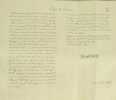










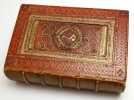




![Centenaire de Félix Guyon. 1831-1931. GUYON, Félix; LEGUEU, Félix]](https://static.livre-rare-book.com/pictures/BBG/96435_01_thumb.jpg)
![Centenaire de Félix Guyon. 1831-1931. GUYON, Félix; LEGUEU, Félix]](https://static.livre-rare-book.com/pictures/BBG/96435_02_thumb.jpg)
![Centenaire de Félix Guyon. 1831-1931. GUYON, Félix; LEGUEU, Félix]](https://static.livre-rare-book.com/pictures/BBG/96435_03_thumb.jpg)



![[ Lot de 5 conférences en tirages limités et un tapuscrit de conférences de la Société J. K. Huysmans ] Deuxième promenade dans le Paris cher à Joris ...](https://static.livre-rare-book.com/pictures/CDL/61192_thumb.jpg)
![[ Lot de 5 conférences en tirages limités et un tapuscrit de conférences de la Société J. K. Huysmans ] Deuxième promenade dans le Paris cher à Joris ...](https://static.livre-rare-book.com/pictures/CDL/61192_2_thumb.jpg)
![[ Lot de 5 conférences en tirages limités et un tapuscrit de conférences de la Société J. K. Huysmans ] Deuxième promenade dans le Paris cher à Joris ...](https://static.livre-rare-book.com/pictures/CDL/61192_3_thumb.jpg)




